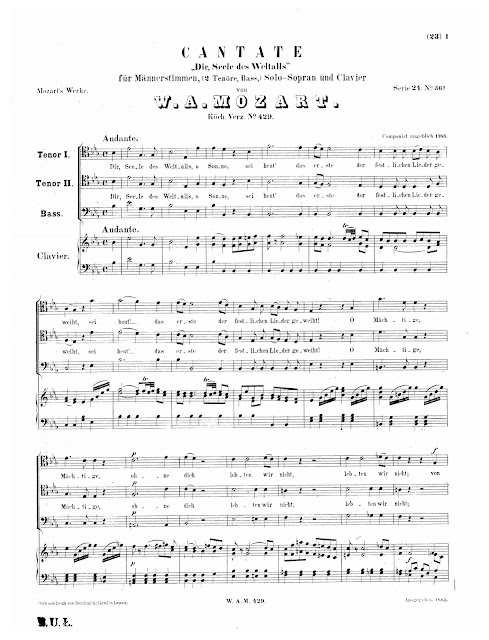CDXCV. MOZART, Wolfgang Amadeus (1756-1791)
Admitted as an "Apprentice" in December 1784, Mozart was promoted to "Fellow" the next January -- just weeks before his 29th birthday. Shortly thereafter, he became a "Master Mason."
As opposed to the Freemasons who dabbled in mysticism and the occult, Mozart was more interested in the rationalist, Enlightenment-inspired members, identified at the time as the Illumanti (today, the group that controls the world, according to some!).
The rationalist Masons were mainly inspired by Jean-Jacques Rousseau and contended that social rank was not the only portal to nobility, and that people of lowly class could be just as noble in spirit as any king or queen.
Perhaps this little cantata was Mozart's application for entrance to the Lodge, judging by the dates.
In any case, the work was left unfinished and completed by Maximillian Stadler, with the third and fourth movements composed by Rainer Bischof.
The rationalist Masons were mainly inspired by Jean-Jacques Rousseau and contended that social rank was not the only portal to nobility, and that people of lowly class could be just as noble in spirit as any king or queen.
Perhaps this little cantata was Mozart's application for entrance to the Lodge, judging by the dates.
In any case, the work was left unfinished and completed by Maximillian Stadler, with the third and fourth movements composed by Rainer Bischof.
We have only a holograph manuscript (c. 1790s) and a piano reduction from IMSLP:
1. Chor: Dir, Seele des Weltalls
2. Aria: Dir danken wir die Freude
3. Duet: Die Lichter, die zu Tausenden (Bischof)
4. Recitative: Dir, Sonne des Weltalls (Bischof)
5. Chor: Dir, Seele des Weltalls










No comments:
Post a Comment